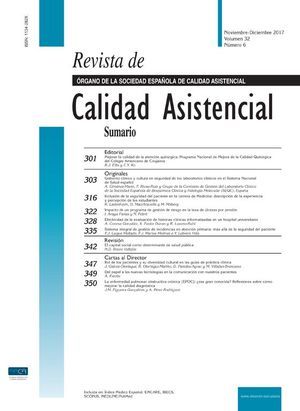The objective of this study was to assess the implementation of Zero Projects in Critical Care Units (CCUs) through Internal Audits (IA).
Materials and methodsDesign: Real-time observational safety analysis. A questionnaire was developed with defined items to ensure objectivity. After IAs, a survey was conducted with the auditors. Scope: 11 CCUs in hospitals of the Servizo Galego de Saúde and Ribera-POVISA. Patients or participants: 24 auditors in 9 teams composed of medical, nursing, and quality personnel from health areas and 34 patients were assessed. Main variables of interest: Compliance with the quality standard (≥60% of items), strengths, areas for improvement, auditor's interest in IA, conformity with the organization and items.
Results100% CCUs met the quality standard. 18.03% of items were fulfilled by all CCUs. Strengths: staff motivation, positive reception of auditors, and use of computer tools in some CCUs. Areas for improvement: deficit of automatic systems for controlling endotracheal tube cuff pressure (compliance rate in 9.1% of CCUs), training needs, communication issues, and not using checklists (45.5% of the reports). Auditors found IA very interesting, and 19% suggested improving organization and items.
ConclusionsAll CCUs met the previously agreed-upon quality standard. Numerous improvement opportunities were identified and communicated to the audited CCUs. For greater homogeneity and objectivity, a review of previously agreed items and definitions is required.
Evaluar la implementación de los Proyectos Zero en las unidades de cuidados críticos (UCC) mediante auditorías internas (AI).
Materiales y métodosAnálisis observacional de seguridad en tiempo real. Se elaboró un cuestionario con los ítems a evaluar que se definieron para garantizar la objetividad. Tras las AI se realizó una encuesta a los auditores. Ámbito: 11 UCC de los hospitales del Servizo Galego de Saúde y Ribera-POVISA. Pacientes o participantes: 24 auditores en 9 equipos compuestos por: personal médico, de enfermería y de calidad de las áreas sanitarias. Se valoraron 34 pacientes.
Variables principalesCumplimiento del estándar de calidad (≥60% de los ítems), puntos fuertes, oportunidades de mejora, interés de la AI para el auditor, conformidad con la organización y con los ítems.
ResultadosEl 100% de las UCC cumplieron el estándar de calidad. El 18,03% de los ítems fueron cumplidos por todas las UCC. Puntos fuertes: motivación del personal, buena acogida a los auditores y herramientas informáticas, en algunas UCC. Principales oportunidades de mejora: dotación de sistemas automáticos para controlar la presión de neumotaponamiento (cumplimiento en el 9,1% de las UCC), necesidades de formación, problemas de comunicación y no usar listados de verificación (45,5%). Las AI fueron muy interesantes para los auditores, aunque el 19% sugirieron mejorar la organización y los ítems.
ConclusionesTodas las UCC cumplieron con el estándar de calidad acordado previamente. Se identificaron numerosas oportunidades de mejora que fueron comunicadas a las UCC auditadas. Para mayor homogeneidad y objetividad se requiere revisar ítems y definiciones acordadas previamente.










